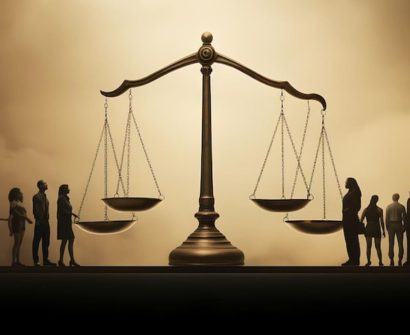
The field of law is not immune from the revolutionary impact of technology in the digital age, as it keeps impacting all facets of our lives. Artificial Intelligence in Law has grown into an influential force in the legal field, upending traditional legal processes and transforming the organizational framework of the legal sector.
Artificial Intelligence in Law: India
- The executive agency for AI-related strategies is the Ministry of Electronics and Information Technology (MEITY), which established committees to develop an AI policy framework.
- Seven responsible AI principles, privacy and security, equality, inclusion and non-discrimination, responsibility, transparency, and the preservation and upholding of human values, have been established by the Niti Ayog.
- It is the constitutional duty of the Supreme Court and lower courts to uphold fundamental rights, such as the right to privacy.
- The Information Technology Act and its implementing regulations are India’s main pieces of legislation pertaining to data protection.
legal ai: Frameworks
- The demand for accuracy, cost-effectiveness, and efficiency has led to a steady increase in the use of artificial intelligence in law.
- The law ai-powered solutions are being used by legal practitioners for a wide range of tasks, such as document automation, legal research, contract assessment, and predictive analytics.
- These technological advancements are expected to improve decision-making, expedite workflows, and increase access to justice.
- The incorporation of artificial intelligence technologies presents notable obstacles to current legal structures.
artificial intelligence and law
Technology Translation in the field of Automatic Speech Recognition (ASR)
- It achieves this by applying natural language processing and language modelling algorithms, which are able to identify, understand, and interpret patterns in human speech.
- Over its existence, ASR technology has consistently improved and developed.
- This cutting-edge AI tool’s most obvious application is the quick and precise transcription of court proceedings or client meetings.
- Compared to traditional human-based transcription services, technology can be a considerably more efficient and economical transcription tool.
In the Field of Automated Marketing Management
- Law firms need to utilize search engine optimization (SEO) and pay-per-click (PPC) advertising to attract new customers and keep hold of current ones.
- When you change your content or ads to show up at the top of the search results page, PPC can produce results right away, but SEO is a long-term approach that may take months of consistent work to see returns.
In the Area of Artificial Intelligence Chatbots
- The front page of many law firm websites features an artificial intelligence chatbot.
- By responding to often asked questions and assisting prospective customers with the appropriate legal procedures, these bots serve as virtual assistants.
- By handling common issues, these bots may be able to expedite processes and increase client engagement even if they will never be able to fully replace a human in a client encounter.
- Even beyond regular business hours, potential customers can still get prompt assistance and responses from chatbots because they are operational 24/7.
Within the Field of Contract Analysis and Review
- The tedious procedure of contract evaluation requires a significant time and energy investment from legal specialists. ai intelligence may be able to expedite this procedure and reduce labour costs.
- Given the required inputs, AI-powered technology may summarize and evaluate contracts more quickly than manual evaluations, assisting lawyers in identifying any flaws.
- By doing this, the time needed to finish each legal document is greatly decreased, allowing law firms to concentrate on final assessments.
ai in law: Major Challenges
There are major challenges in ai laws. They are:
Security and Data Attacks:
- This action may violate an organization’s data retention policy and provide a risk of data leaking due to AI security concerns.
- This important legal issue may potentially endanger national security if an entity has connections to the federal government.
- When you enter sensitive third-party or internal company data into ChatGPT, it becomes part of the chatbot’s data model and is accessible to other users with relevant queries.
The Complexities of Intellectual Property:
- It can be difficult to identify the author of the text or code that ChatGPT generated. The input provider is in charge of the output as per the terms of the service agreement.
- However, if the output includes data that is safeguarded by law from inputs that don’t follow AI compliance guidelines, issues related to intellectual property may surface.
- If generative AI generates text that originated from copyrighted property, it may give rise to copyright concerns in the legal business. This would be against AI compliance regulations and put users in danger of legal action.
Confidentiality Issues:
- Due to ChatGPT’s security, private information is disclosed, risks are identified, the company’s reputation is put at risk, and there may be legal issues pertaining to artificial intelligence.
- Sharing private information about partners or consumers is illegal and prohibited by contracts.
- Let’s examine a medical facility that uses ChatGPT to answer patient questions as an example. You face the danger of breaking the law and infringing on patients’ right to privacy if you give ChatGPT private patient information, including medical data.
One important frontier in the continuing growth of the legal profession is the interaction of artificial intelligence and law. Although AI has the potential to bring about revolutionary change, it also brings with it a number of difficult issues that call for careful analysis and early intervention. We can use Artificial Intelligence in Law to create a judicial system that is more fair, just, and accessible for everyone if we approach these obstacles with integrity and vision.
Artificial Intelligence in Law FAQs
- How is artificial intelligence used in law?
AI law algorithms are used by legal businesses to handle their electronic records more effectively. It expedites the search process and aids attorneys in organizing and storing documents such as contracts, cases, emails, and notes. Massive volumes of data can be quickly analyzed by AI to locate what you need.
- Is artificial intelligence a threat to lawyers?
AI is far more efficient than a human lawyer at processing vast amounts of data and providing accurate legal answers in a timely manner. AI is faster and more efficient at restating laws and regulations than it is at creating legal opinions. But this does not portend the demise of the legal industry.
- What are the opportunities of AI in law?
These days, law firms are using AI to automate repetitive processes like contract analysis and document review, which reduces both the time and expense involved. Think about how it affects due diligence. Artificial Intelligence can sort through massive amounts of data much faster than a person could.
- What are the disadvantages of AI in law?
- Algorithm Bias: The training data used to create AI algorithms can have biases. To maintain justice, legal practitioners must be watchful in spotting and eliminating these biases.
- Limited Contextual Knowledge: AI systems require a more sophisticated knowledge than human lawyers, even with their analytical abilities.
- What are the benefits of AI in law?
Legal businesses can utilize AI to evaluate contracts, automate document management, help with research, and improve communication. AI is faster than humans at jobs using data. Time is saved, and output is raised.
- Which Online rjs coaching is best for RJS preparation?
The reputable Jaipur Online rjs coaching program “Jyoti Judiciary Coaching” aids students in getting ready for the RJS exam. A systematic approach to RJS test preparation is made possible by Jyoti Judiciary, the top offline and online RJS coaching program in Jaipur. Their curriculum has been carefully designed to cover all the subjects and courses required for passing the Rajasthan Judicial Service Examinations.
- Which coaching is best for judiciary?
The most effective judiciary coaching in Jaipur is provided by Jyoti Judiciary Coaching. The objective is to create a comfortable learning environment for the students. It makes the difficult task seem easy, which increases the likelihood of achieving the desired outcome. The objective at Jyoti Judiciary is to give students the best possible education possible. The Institute pledges to use every resource at its disposal to provide you with the finest preparation for the Judicial Services entrance examinations.
With the goal of giving students the best coaching available for law entrance exams including the CLAT, AILET, and various other numerous state judiciary exams, Jyoti Judiciary Coaching, India’s Finest educational Platform, was established. Come enrol now with Jyoti Judiciary!
For any latest news, legal topics, judiciary exams notifications, patterns, etc watch Jyoti Judiciary’s YouTube channel for legal videos for any updates at https://youtube.com/@jyotijudiciarycoaching4852?si=2cwubh9d2A9urwJf










